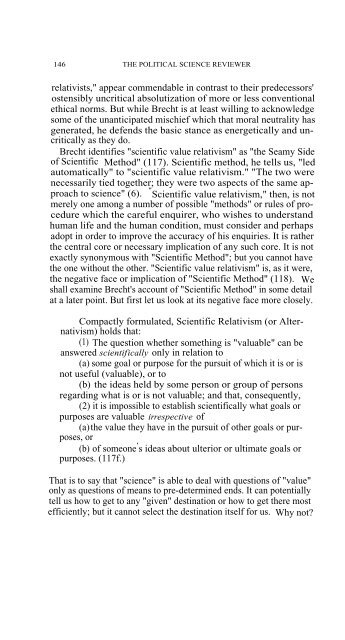ARNOLD BRECHT'S POLITICAL THEORY REVISITED Political ...
ARNOLD BRECHT'S POLITICAL THEORY REVISITED Political ...
ARNOLD BRECHT'S POLITICAL THEORY REVISITED Political ...
You also want an ePaper? Increase the reach of your titles
YUMPU automatically turns print PDFs into web optimized ePapers that Google loves.
146 THE <strong>POLITICAL</strong> SCIENCE REVIEWER<br />
relativists," appear commendable in contrast to their predecessors'<br />
ostensibly uncritical absolutization of more or less conventional<br />
ethical norms. But while Brecht is at least willing to acknowledge<br />
some of the unanticipated mischief which that moral neutrality has<br />
generated, he defends the basic stance as energetically and uncritically<br />
as they do.<br />
Brecht identifies "scientific value relativism" as "the Seamy Side<br />
of Scientific Method" (117). Scientific method, he tells us, "led<br />
automatically" to "scientific value relativism." "The two were<br />
necessarily tied together; they were two aspects of the same approach<br />
to science" (6). " Scientific value relativism," then, is not<br />
merely one among a number of possible "methods" or rules of procedure<br />
which the careful enquirer, who wishes to understand<br />
human life and the human condition, must consider and perhaps<br />
adopt in order to improve the accuracy of his enquiries. It is rather<br />
the central core or necessary implication of any such core. It is not<br />
exactly synonymous with "Scientific Method"; but you cannot have<br />
the one without the other. "Scientific value relativism" is, as it were,<br />
the negative face or implication of "Scientific Method" (118). We<br />
shall examine Brecht's account of "Scientific Method" in some detail<br />
at a later point. But first let us look at its negative face more closely.<br />
Compactly formulated, Scientific Relativism (or Alternativism)<br />
holds that:<br />
(1) The question whether something is "valuable" can be<br />
answered scientifically only in relation to<br />
(a) some goal or purpose for the pursuit of which it is or is<br />
not useful (valuable), or to<br />
(b) the ideas held by some person or group of persons<br />
regarding what is or is not valuable; and that, consequently,<br />
(2) it is impossible to establish scientifically what goals or<br />
purposes are valuable irrespective of<br />
(a)the value they have in the pursuit of other goals or purposes,<br />
or<br />
(b) of someone ' s ideas about ulterior or ultimate goals or<br />
purposes. (117f.)<br />
That is to say that "science" is able to deal with questions of "value"<br />
only as questions of means to pre-determined ends. It can potentially<br />
tell us how to get to any "given" destination or how to get there most<br />
efficiently; but it cannot select the destination itself for us. Why not?
















